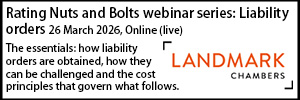Commercial leases and unpaid rent
- Details
Are we turning a corner? Priya Sejpal examines the Government Policy Statement on COVID-19 enforcement and rent recovery restrictions for commercial leases.
The Government’s recently published policy statement (the Policy) has been widely reported since 4 August 2021, details of which can be found on the gov.uk website.
Essentially, if you are a commercial landlord in England, you will not be permitted to take enforcement action for unpaid rent until 25 March 2022 owing to a moratorium that has been put in place. The Policy, however, clarifies the government’s intention to ring-fence certain arrears, impose an arbitration process and introduce a strengthened Code of Practice. So are we now turning a corner?
Critical observations and questions about the Policy
Arrears
- The Policy clarifies that the moratorium which has been extended to 25 March 2022 is a backstop, rather than a definitive or concrete date. Therefore, if legislation to enact the binding arbitration process is introduced earlier, the moratorium will be lifted for all arrears except those that have been "ring-fenced". It is not, however, clear when this new legislation will be put into place and what happens if it is enacted after 25 March 2022.
- The proposed new legislation applies to tenants who have been impacted by COVID-19 business closures. In other words, the ring-fenced period is from March 2020 until restrictions for that sector are removed. This means that landlords will be able to evict tenants for the non-payment of rent arrears incurred prior to March 2020 and from the end of the ring-fenced period. Whilst this may provide some comfort to some landlords, it is widely reported that the hospitality sector are still struggling with rent payments, particularly for pubs, bars and restaurants with just 28.4% of rent paid 90 days after the March payment date.
- Where tenants can pay, they should clearly state in writing to their landlord how payments should be treated, specifying the period of time that the payment should be apportioned to.as this will avoid it potentially being offset against the ‘ring-fenced’ rent and falling outside of the tenant protection measures and the arbitration process. Clarity on apportionment will be key to avoid disputes arising in the future.
- Landlords can charge interest on rent incurred from the end of the ring-fenced period, subject to the terms of their lease.
- The Policy encourages tenants to pay rent where they can in accordance with the terms of their lease and a revised voluntary Code of Practice will be introduced to help with this but this very much hinges on negotiation and we are hearing that many landlords and tenants are still struggling to reach a happy compromise. Negotiation is an art, a skill learnt which unfortunately, so many are not equipped with especially in times of heightened anxieties.
- Landlords are expected to defer or waive an appropriate proportion of rent arrears, but as to what an appropriate proportion means, seems to be subjective and no doubt sector-specific.
- It is not clear how the legislation will handle some sectors and businesses, such as restaurants that were forced to close but could still trade well through takeaways. How does home-working fit into all of this? Is the proposed legislation too simplistic?
- It is also not clear how existing rent arrears debt claims in the courts may or may not be affected by the new legislation; the very rents being litigated through the courts could now be subject to ring-fencing. So we may see tenants seeking a stay of proceedings pending implementation of the arbitration scheme.
Arbitration
- Clarification is needed on the arbitration process too. Landlords and tenants will be expected to share the costs of the arbitration if both are found to have negotiated in good faith, but arbitrators will be given the power to award costs to either party as part of their decision. What will be deemed as negotiations done in bad faith?
- It also expected that arbitrators will have the power to vary the lease obligations between landlords and tenants but altering contractual rights freely negotiated between commercial parties is extreme given that the courts are often reluctant to interfere with the relationship between contracting parties. As such, we expect that the legislation will be robust enough to withstand potential challenges under the Human Rights Act.
- There is likely to be a deluge of arbitrations to come, the question is do we have enough arbitrators to assist on demand and what kind of training will they undergo to prove their impartiality.
- What will the state of play be if there are arrangements with third parties, such as a superior landlord or with the mortgage company, which directly affect a landlord’s ability to agree concessions with a tenant.
Remedies
The remedies presently available to landlords are as follows:
- Landlords can still draw down on rent deposits and seek top-ups
- Claims can be made against guarantors
- Claims against Authorised Guarantee Agreements or Guarantees of Authorised Guarantee Agreements for post-1996 leases
- Claims against former tenants or former guarantors for pre-1996 leases
- The usual debt proceedings can be brought in Court
- Proceedings for possession can be brought on the basis of breach of covenants other than non-payment of rent.
- CRAR only if there is more than 554 days’ worth of arrears
Landlords currently cannot use statutory demands or winding up petitions to elicit payment of arrears up until 30 September 2021; it is expected that measures on the use of insolvency will be announced in due course.
Please note, this is not an exhaustive list of remedies available to landlords and legal advice should always be sought.
Conclusion
There are a number of uncertainties in what the forthcoming legislation will look like but what can be said with certainty is that where COVID-19 closure restrictions are lifted, tenants should begin to pay rent in accordance with the terms of their lease, or as otherwise agreed with their landlord.
Where a tenant is unable to pay in full, landlords and tenants should be coming together to negotiate in good faith. The UK Government encourages all landlords and tenants to try and agree mutually beneficial solutions; the key takeaway from all of this seems to be to communicate, collaborate and comply.
Priya Sejpal is an Associate at BLM Law.
Sponsored articles
Walker Morris supports Tower Hamlets Council in first known Remediation Contribution Order application issued by local authority
Unlocking legal talent
Legal Director - Government and Public Sector
Legal Officer
Senior Solicitor - Property
Locums
Poll















































